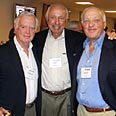
Olmert: Restraint keeps Abbas link alive
Prime minister tells UJA Federation delegates, 'New winds are blowing through the region'
"The Palestinians are not the most credible of partners… to put it softly," Olmert said. "We agreed a ceasefire with them in November, and since then there hasn't been a single day without Qassam fire. And yet we have been restrained," he added.
"Because, we must ask, do we have among the Palestinians a better potential partner than Abu Mazen? Do we want to lose the last link left with the Palestinians, and have no one to talk to?" the prime minister asked.
"I'm optimistic, I believe there is still a chance, within five years, for a historic breakthrough with the Palestinians and Arab states," he added. "There were winds of change blowing through Arab and Muslim states. Previously, they were not willing to recognize that we exist. Now, so many came together to discuss how they can make peace with Israel."
"I'm ready to sit with them. I don't say I will accept everything they say, but I will not reject anything from the outset. I have no preconditions. I'm willing to listen and to consider seriously the arguments they put forward," he added.

PM addressed UJA delegates (Photo: Gil Yohanan)
Addressing the Iranian threat, Olmert told the UJA delegation that the menace emanating from Tehran "cannot be overestimated."
"The fact that a leader of a nation of over 70 million people dares openly to talk about the liquidation of another state…while working to a gain nuclear capacity cannot be tolerated," Olmert said.
He added that "all free loving nations" were at risk, and that the West had to work together to end Iran's nuclear program.
"I'm hopeful that this effort can succeed without a military operation," Olmert said. "I'm grateful for the investment by the US, under the leadership of George W. Bush, to stop Iran from acquiring nuclear capabilities."
Olmert added that Tehran's nuclear program was not as far advanced as Iran would like the world to believe. "I can say this, and believe me I know, they are not as close to the nuclear threshold as they want us to believe, but not as far as I'd like them to be," he said.
'North safer after Lebanon War'
Olmert also reiterated his belief that northern Israel was safer following the Second Lebanon War.
"Instead of Hizbullah, there is an international force of 26,000 deployed, and not a single Hizbullah terrorist dares surface with a gun on the border. That adds a lot of security," he said.
The UJA Federation of New York came to Israel as part of its celebrations for its 90th birthday, and its members viewed a number of programs which were made possible by UJA donations.
Jules Wachter, of New York, told Ynetnews: "New York Jews feel a kindred spirit with the Israeli people. We feel as one with Israel."
A doctor by profession, Wacter said he was amazed to see a program in the Sheeba medical center to help children suffering from deformities, one of the many programs now receiving UJA funding.
Todd Blinder, of Florida, said, "As an American Jew, even though I didn't understand the language, viewing the Remembrance Day ceremony in Jerusalem was one of the most moving experiences of my life. We may support Israel, but you are the ones keeping it. The memorial was heart wrenching."
Blinder said his wife was frightened to come to Israel, but that he would ensure that she and their children would visit soon.
"Here, Israelis deal with things we can't understand. They are in the center of it, every day. And the world refuses to understand what defensible borders mean to Israel," he said.










